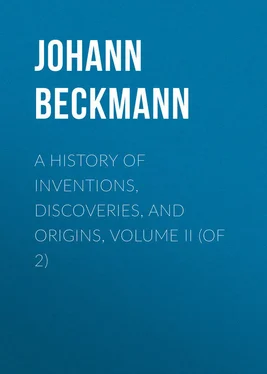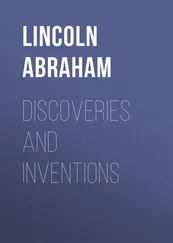Johann Beckmann - A History of Inventions, Discoveries, and Origins, Volume II (of 2)
Здесь есть возможность читать онлайн «Johann Beckmann - A History of Inventions, Discoveries, and Origins, Volume II (of 2)» — ознакомительный отрывок электронной книги совершенно бесплатно, а после прочтения отрывка купить полную версию. В некоторых случаях можно слушать аудио, скачать через торрент в формате fb2 и присутствует краткое содержание. Жанр: foreign_antique, foreign_prose, на английском языке. Описание произведения, (предисловие) а так же отзывы посетителей доступны на портале библиотеки ЛибКат.
- Название:A History of Inventions, Discoveries, and Origins, Volume II (of 2)
- Автор:
- Жанр:
- Год:неизвестен
- ISBN:нет данных
- Рейтинг книги:4 / 5. Голосов: 1
-
Избранное:Добавить в избранное
- Отзывы:
-
Ваша оценка:
- 80
- 1
- 2
- 3
- 4
- 5
A History of Inventions, Discoveries, and Origins, Volume II (of 2): краткое содержание, описание и аннотация
Предлагаем к чтению аннотацию, описание, краткое содержание или предисловие (зависит от того, что написал сам автор книги «A History of Inventions, Discoveries, and Origins, Volume II (of 2)»). Если вы не нашли необходимую информацию о книге — напишите в комментариях, мы постараемся отыскать её.
A History of Inventions, Discoveries, and Origins, Volume II (of 2) — читать онлайн ознакомительный отрывок
Ниже представлен текст книги, разбитый по страницам. Система сохранения места последней прочитанной страницы, позволяет с удобством читать онлайн бесплатно книгу «A History of Inventions, Discoveries, and Origins, Volume II (of 2)», без необходимости каждый раз заново искать на чём Вы остановились. Поставьте закладку, и сможете в любой момент перейти на страницу, на которой закончили чтение.
Интервал:
Закладка:
Professor Heeren showed me a passage in the Ecloga of Stobæus, which, on the first view, seems to allude to a glass mirror 179 179 Stob. Eclog. Antv. 1575, fol. p. 56.
. It is there said, Philolaus the Pythagorean believed that the sun was a vitreous body, which only received the rays of the æthereal fire and reflected them to us like a mirror. When we compare, however, the words of Stobæus with those by which Plutarch 180 180 De Placitis Philos. ii. cap. 20.
, Achilles Tatius 181 181 In Aratum, cap. 19.
, Eusebius 182 182 Lib. i. cap. 8.
, and others, express the same thing, that meaning cannot be drawn from them. It appears, at first, as if Philolaus had considered the sun to be transparent, and supposed that the rays passed through it, and came condensed to our earth, in the same manner as they are brought to a focus by a glass globe. Some commentators have explained the passage in this manner; and on account of the affinity of the Greek words have thought also of a funnel. In that case, however, the comparison of the sun with a mirror would not have been just; and if it be admitted that Philolaus considered the sun as a bright body endowed with the property of reflection, what he says of rays passing or transmitted through it, and of the pores of the sun’s body, will become unintelligible. But even if we adopt the last explanation, that Philolaus imagined the sun to be a mirror, it does not follow that he had any idea of a glass one 183 183 It is undoubtedly certain, that ὕαλος, which is translated vitreous or glassy , means any smooth polished body capable of reflecting rays of light. Originally it signified a watery body; and because watery bodies have a lustre, it was at length used for glass. See Salmas. ad Solin. p. 771.
; and besides, he only speaks of a body capable of reflecting a strong light; and that glass, under certain circumstances, is fit for that purpose, may have been remarked as soon as it was invented, though men might not find out the art of forming it into proper mirrors by placing some opake substance behind it 184 184 More observations respecting the opinion of Philolaus may be found in the edition of Plutarch’s work De Placitis Philosophorum by Ed. Corsinus, Flor. 1750, 4to, p. 61, and p. 23.
. Empedocles also said, that the sun was a mirror, and that the light received by our earth was the reflection of the æthereal fire, which Eusebius compares to the reflection made by water 185 185 Professor Heeren having given me his opinion on this passage of Stobæus, I shall here insert it for the satisfaction of the learned reader. The critics, says he, will hardly be persuaded that the words καὶ τὸ ἀπ’ αὐτοῦ πυροειδὲς κατὰ τὸ ἐσοπτροειδὲς are correct, as they can be translated different ways. With regard to the explanation of the matter, I build only on the plain meaning of the words. The author tells us, that Philolaus thought the sun to be a mirror; but we must conclude that he speaks of a mirror such as were then in use; a smooth plate of metal, and not a globe. In this case the first explanation of a glass globe falls to the ground. This is confirmed by Eusebius, who calls it ὑαλοειδὴς δίσκος, though it is possible that the latter word may be a gloss added by some grammarian, or by Eusebius himself. If we enter further into the explanation, we must adopt the plain idea, that the rays of the sun fall upon this plate, and are reflected to us. I am however of opinion, that ὕαλος ought to be translated glass , ὑαλοειδὴς glassy or vitreous ; for the intention of Philolaus evidently was to define the substance of the sun’s body. The result of the whole is, Philolaus considered the sun as a plain plate of glass which reflected the rays or brightness of the æthereal fire. But that he was acquainted with a proper glass mirror does not thence follow with certainty.
.
In the problems ascribed to Alexander of Aphrodisias, glass mirrors, covered on the back with tin, are clearly mentioned; but this information does not lead us one step further in the history of the art; as it is proved that the above Alexander, who lived in the beginning of the third century, could not have written that work. The author, who must have been a physician, maintains the immortality of the soul, which Alexander of Aphrodisias, with Aristotle, denies. Some therefore have ascribed these problems to Alexander Trallianus, who practised physic in the middle of the sixth century; but this is only a conjecture which no one has as yet rendered probable, especially as there have been many physicians of the name of Alexander. The problem to which I allude is not to be found in every manuscript and edition; so that it is doubtful whether it may not be the production of a later author than that of the rest of the book, particularly as it is certain that many who had it in their possession added problems of various kinds according to their pleasure. However this may be, it is evident that the author of this problem was acquainted with mirrors covered at the back; and the expression which he uses does not merely imply that a leaf of tin was placed behind the glass plate, but that the tin in a liquid state was rubbed over it. The old French translator thinks that the author speaks of windows; but that opinion is undoubtedly false 186 186 Pourquoy reluient les fenestres de verre si fort? Pourtant que la nature de l’estain, duquel elles sont basties par dedans, fort clere, meslée avec le verre cler aussi de lui mesme reluyst d’avantage; et le quel estain outrepassant ses raïons par les petits pores du verre, et augmentant doublement la face extérieure du dit verre, la rend grandement clere. – Problemes d’Alexandre Aphrod., traduit par M. Herret. Paris 1555, 8vo, p. 50.
.
Of as little importance as the above passage of Alexander, is another of Isidore, often quoted in support of the antiquity of glass mirrors. On the first view it appears to be a testimony of great weight; but when closely examined it becomes reduced to very little. “Nothing,” says he, “is so fit for mirrors as glass 187 187 Origin. lib. xvi. 15, p. 394.
.” Abat and others, who have considered these words as decisive, make less hesitation to ascribe to the sixth century, in which Isidore lived, a knowledge of mirrors covered on the back with tin and quicksilver, as the same writer, in another place, observes, that quicksilver can be kept in no vessel but one of glass 188 188 Origin. lib. xvi. 18, p. 396.
. It is very true that a glass filled with that metal will form a very good mirror; but I am of opinion that this may have been long known, before people thought of making an amalgam of tin and quicksilver in order to cover the backs of mirrors. The first passage, which is properly the one of any consequence, loses its force when we see that it is taken from Pliny and copied incorrectly. The latter says, that one can give to glass every kind of shape and colour, and that no substance is more ductile, or fitter to be moulded into any form 189 189 Lib. xxxvi. cap. 26, p. 759.
. Isidore, as is usual, says the same thing, and in the same words, except, that instead of sequacior he substitutes speculis aptior ; so that the mention of a mirror is altogether unexpected, and so little suited to what goes before and what follows, that one must believe that this alteration, occasioned perhaps by the similitude of the words, or by an abbreviation, was not made by Isidore, but by some transcriber. But even if we believe that Isidore himself spoke of glass being used at that period for mirrors, we are not able to comprehend, from what he says, how glass mirrors were made in the sixth century.
Интервал:
Закладка:
Похожие книги на «A History of Inventions, Discoveries, and Origins, Volume II (of 2)»
Представляем Вашему вниманию похожие книги на «A History of Inventions, Discoveries, and Origins, Volume II (of 2)» списком для выбора. Мы отобрали схожую по названию и смыслу литературу в надежде предоставить читателям больше вариантов отыскать новые, интересные, ещё непрочитанные произведения.
Обсуждение, отзывы о книге «A History of Inventions, Discoveries, and Origins, Volume II (of 2)» и просто собственные мнения читателей. Оставьте ваши комментарии, напишите, что Вы думаете о произведении, его смысле или главных героях. Укажите что конкретно понравилось, а что нет, и почему Вы так считаете.












